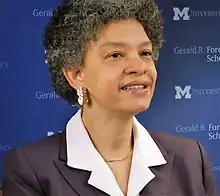Susan M. Collins (economist)
Susan M. Collins is an American scholar in the fields of economics and public policy. As of January 30, 2020, she is the acting provost of the University of Michigan.[1]
Susan Collins | |
|---|---|
 Collins speaks at the Gerald R. Ford School of Public Policy in 2012 | |
| Born | |
| Spouse(s) | Donald Vereen |
| Academic background | |
| Education | Harvard University (BA) Massachusetts Institute of Technology (MA, PhD) |
| Thesis | Devaluations, Fixed Exchange Rates and Credibility Crises (1984) |
| Academic work | |
| Discipline | Economics |
| Sub-discipline | Macroeconomics |
| Institutions | Harvard University, Georgetown University, University of Michigan |
| Main interests | Determinants of economic growth; Exchange rate regimes in developed and developing economies; Cross-national economic integration |
She received her B.A. in economics from Harvard University in 1980, and her Ph.D. from the Massachusetts Institute of Technology in 1984. She has held various teaching positions at Harvard, Georgetown University and the University of Michigan, and also served on the President's Council of Economic Advisers from 1989 to 1990 and was a visiting scholar at the International Monetary Fund in 2001.[2]
Collins is the Edward M. Gramlich Professor of Public Policy and a professor of economics at the University of Michigan, where she also served as dean of the Ford School from 2007 to 2017.[3] She is a nonresident senior fellow in the Economic Studies program at the Brookings Institution[4] and is a member on the Board of Directors at the Federal Reserve Bank of Chicago.[5]
Collins was involved in the controversy surrounding the University of Michigan's reopening during the COVID-19 pandemic. On September 8, 2020, the university's graduate student employees went on strike because of concerns related to the university's pandemic response.[6] As the university's chief academic officer, Collins was involved in negotiations with the graduate students while also urging students not to disrupt campus operations and claiming that the strike was illegal because it was not directly related to "wages, hours, or working conditions" despite the university's refusal to adhere to contract's requirement to provide a safe working environment and the strike being directly related to the university's refusal to adhere to the contractual obligations they agreed to only months prior. [7] In a publicly broadcast question and answer session on September 15, 2020, Collins said of the administration's pandemic response: “We have not done nearly as well as we needed to.”[8]
Selected publications
- Bosworth, Barry, and Susan M. Collins. "Accounting for growth: comparing China and India." Journal of Economic Perspectives 22, no. 1 (2008): 45–66.
- Collins, Susan M., Barry P. Bosworth, and Dani Rodrik. "Economic growth in East Asia: accumulation versus assimilation." Brookings papers on economic activity 1996, no. 2 (1996): 135–203.
- Bosworth, Barry P., Susan M. Collins, and Carmen M. Reinhart. "Capital flows to developing economies: implications for saving and investment." Brookings papers on economic activity 1999, no. 1 (1999): 143–180.
- Razin, Ofair, and Susan M. Collins. Real exchange rate misalignments and growth. No. w6174. National Bureau of Economic Research, 1997.
- Collins, Susan M. "On becoming more flexible: Exchange rate regimes in Latin America and the Caribbean." Journal of Development Economics 51, no. 1 (1996): 117–138.
References
- "Susan M. Collins, former Ford School dean, named acting provost | The University Record". record.umich.edu. Retrieved 2020-01-31.
- Susan M Collins' CV
- Ford School faculty page
- https://www.brookings.edu/experts/susan-m-collins/
- Susan M. Collins Class B Director, FRB Chicago. Term: 2016-2018
- Terranella, Slone (September 8, 2020). "University of Michigan graduate instructors hit the picket line". Detroit Free Press. Retrieved September 12, 2020.
- https://www.michigandaily.com/section/academics/deans-emails-strike
- https://www.mlive.com/news/ann-arbor/2020/09/university-of-michigan-president-provost-address-universitys-pandemic-response.html